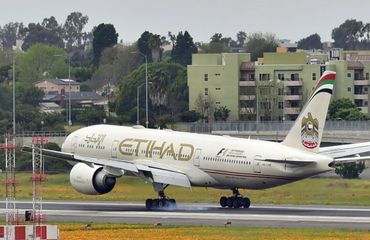São Paulo – Etihad Airways, the UAE-based carrier, had a net loss of USD 1.87 billion last year, it reported this Thursday (27). Revenue was USD 8.36 billion, with an all-time best in passenger numbers at 18.5 million people.
The airline imputed the result to assets depreciation and losses on fuel hedging. Industry players often resort to hedge contracts to protect themselves against future fuel price fluctuations. Whenever the going price for fuel drops below the contracted cost for a given timeframe, the company loses. Etihad said it expects hedge repercussions to not be as serious in 2017.
Asset depreciation losses amounted to USD 1.9 billion, with USD 1.06 billion being aircraft-related. According to Etihad, this partly reflects a drop in aircraft market value. Another USD 808 million in losses came from asset payments and financial exposures to equity partners including Alitalia and Airberlin.
Etihad stressed that its load factor was 79% and that revenue from passenger trips – its main source of income – was USD 4.9 billion in 2016. Available seat kilometers increased by 9%. The carrier also said it saw a slowdown in its cargo business, although volume handled improved slightly to 595,519 tons last year.
Etihad Aviation Group board chairman Mohamed Mubarak Fadhel Al Mazrouei said that “a culmination of factors contributed to the disappointing results in 2016.” He also said the board and executives have been working since last year to address the issues and challenges through a comprehensive strategic review aimed at driving improved performance across the group.
Mazrouei also pointed out Etihad’s role as a “significant economic enabler” for Abu Dhabi (from where the airline’s UAE flights leave). “Our airline business continues to support Abu Dhabi’s vision to develop tourism, grow commerce and strengthen links to key regional and international markets,” he said.
CEO Peter Baumgartner claimed the industry is “characterized by overcapacity, declining market sizes on key routes and changing customer behavior as a weak global economy affects spending appetite.”
“Operationally, we performed well in 2016. We maintained load factor levels even as we increased capacity,” he said. “Our fuel hedging positions, which helped manage fuel spend during the oil price boom.”
Etihad launched a nonstop São Paulo-Abu Dhabi flight in 2013, but cancelled it last March. The carrier explained on announcing the cancelling that Brazil’s economic scenario and the sharp currency depreciation had weighed down on the route’s performance.
*Translated by Gabriel Pomerancblum




